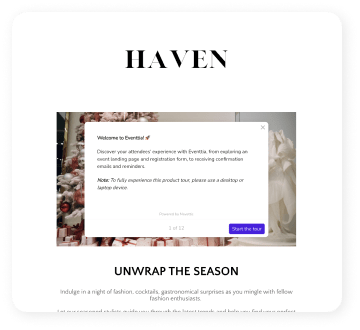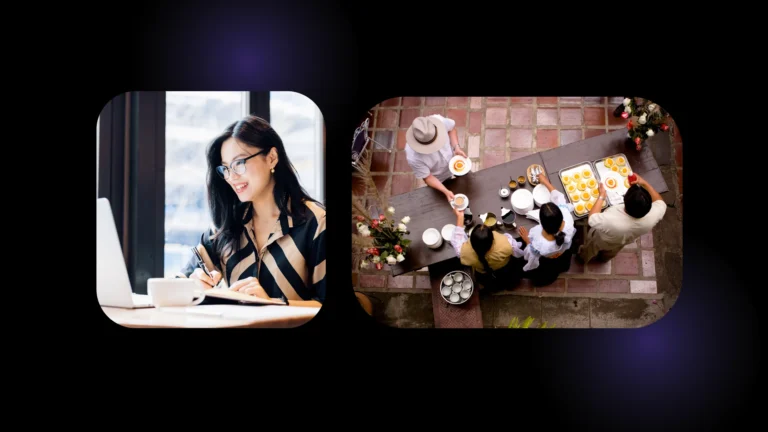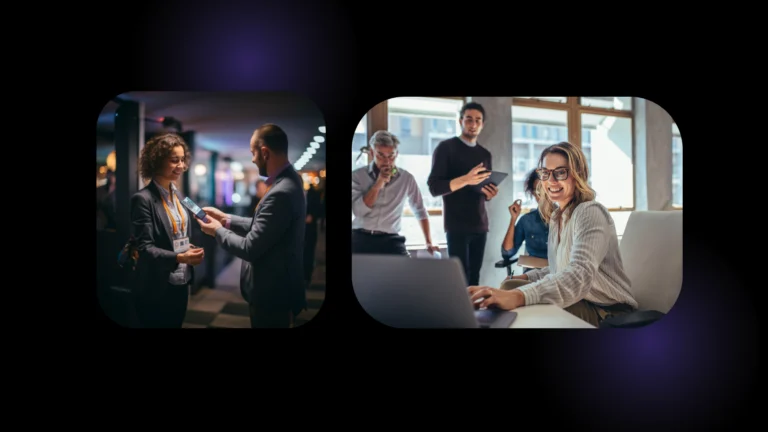Exceptional content is the lifeblood of any successful event … or at least this is what we used to think. Nowadays, however, some may argue that people aren’t just looking for knowledge at events anymore. Now their main goal at events is to have face-to-face experiences and engage in networking exchanges.
Considering the easy access people have to constantly updated information, they might have insights that are still unknown to industry experts (invited as speakers at your event).
Quality YouTube videos, accessible research papers, great articles, and interviews with high-class thought leaders are more than enough to keep everyone up-to-date and diminish the content relevance of an event.
That’s why we might think that the average attendee will ignore the event program (or at least not take too much interest in it) and instead pursue his or her personal agenda by networking with other guests who can be of assistance.
While this logic makes sense, the truth is that events still remain to be a great place to acquire new knowledge and insights.
Think about company blogs, for example. Some of them aren’t saying anything new, just repeating the same words and ideas you’ve heard from other blogs. Successful company blogs, on the other hand, offer original content that helps their audiences and equips them with powerful thinking models and unique perspectives.
Events work the same way.
If you build a program that uses the same old content standards, inviting experts to talk about things everyone already knows, and ignoring the innovative approach, your event will be, well, boring (to say the least).
But if you focus on designing a truly interesting and rewarding event agenda, people will recognize your event’s value and be happy to attend.
So how do you that, especially when you have to compete with so many other channels and platforms?
Here are a few steps that will help you:
Step #1. Search for the REAL experts
As Seth Godin recently noted, “The Mona Lisa has a huge social media presence. Her picture is everywhere. But she doesn’t tweet. She’s big on social media because she’s an icon, but she’s not an icon because she’s big on social media.”
So instead of going after the “media influencers,” dig deeper and discover industry experts who aren’t maybe as well known, but still have plenty to offer in terms of ideas and information.
Step #2. Focus on one specific topic
General event topics can be seen as too wide and overwhelming. They also deprive you (and your attendees) from finding tasty content ideas and interesting insiders. Narrow it down and choose a specific angle.
For example, instead of talking about smart cities, your event could tackle the topic of smart cities and social participation or smart cities and climate change. By centering in on one topic, you’ll add more character and attractiveness to the subject.
Step #3. Identify the most recent research papers
Don’t discard science. Chances are there’s some less-known but relevant research published that can become the backbone of your content. Attendees will see your event as important enough to spend time and money on, because they’re getting new and exclusive industry findings.
Step #4. Visualize and present possible future scripts
Take it one step further and make your event an environment of discussion, using the existing industry insights and evidence for future predictions (with the help of the expert speakers).
For example, instead of having a presenter speak about a topic he or she knows by heart (while the audience is listening passively), think about setting up interactive sessions that let the attendees participate and work with the speaker to develop a future action plan or script for the industry.
Step #5. Collaborate with your speakers on their presentations
We all know that keynote speaker who delivers the same talk at all events (and has a few YouTube videos out there presenting the same speech word for word).
Who wants to hear the same speech over and over again?
Not people who paid good money to attend an event to learn new things. To prevent this from happening, work with your speakers to build new, fresh presentations that will be exclusively delivered at your event and nowhere else.
Step #6. Prepare the scene for debates
No, we aren’t implying your event should be a boxing ring. But you could invite different parties to discuss opposing sides of a topic.
For example, if you’re planning an event for the public transportation professionals, you could invite taxi drivers and Uber company representatives to talk about the challenges the sharing economy is generating.
A healthy debate will help your attendees have a clear understanding of what’s happening in the industry while also having the freedom to explore different points of view.
Step #7. Give your attendees the chance to acquire new skills
Apart from making your event all about knowledge, set up skill transfer sessions for the attendees, like master classes from professionals, for example. This will give them the ability to actually learn new skills or improve their existing ones.
Step #8. Provide actionable information
Presenting data and statistics at events can be useful, but only if people know what to do with it and how to use it in their own day-to-day lives. So instead of building sessions around dry presentations, get your speakers to deliver talks that will help your attendees apply the data to overcome specific challenges and solve different problems they might have.
Step #9. Crowdsource content ideas
Who will know what type of content and which speakers will be most helpful better than your attendees themselves? Before you start to plan your event, look for content ideas via social media or email and get your audience on board by making them the co-creators of the event agenda.
Step #10. Encourage attendees to explore ideas together
Knowledge sharing shouldn’t be one-sided (from the speaker to the attendees). Your audience will usually be refined enough that they can work together to explore different ideas and learn from each other. Get your attendees to work in groups, answer different questions, and solve multiple industry challenges. The results may surprise everybody.
What makes your event valuable?
When designing an event program, always ask yourself what will be truly attractive and meaningful for your attendees. What value do you want to create for them? What content or knowledge will improve their professional or personal lives? Then, start designing a content agenda using the steps above. Good luck!






